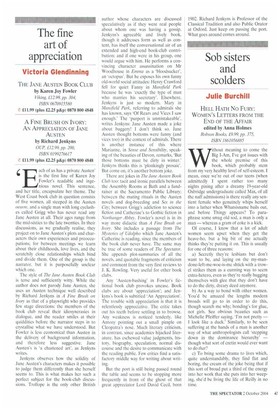The fine art of appreciation
Victoria Glendinning
THE JANE AUSTEN BOOK CLUB by Karen Joy Fowler Viking, £12.99, pp. 304, ISBN 0670915580 t £11.99 (plus £2.25 p&p) 0870 800 4848 A FINE BRUSH ON IVORY: AN APPRECIATION OF JANE AUSTEN by Richard Jenkyns OUP, £12.99, pp. 200, ISBN 0199276617 t £11.99 (plus £2.25 p&p) 0870 800 4848 E
‘ ac h of us has a private Austen' is the first line of Karen Joy nious novel. This sentence, and her title, encapsulate her theme. The West Coast book club in question consists of five women, all steeped in the Austen oeuvre, and a single man with long eyelashes called Grigg who has never read any Jane Austen at all. Their ages range from the mid-sixties to the late twenties. In their discussions, as we gradually realise, they project on to Jane Austen's plots and characters their own experiences and preoccupations; for between meetings we learn about their childhoods, love lives, and the scratchily close relationships which bind and divide them. One of the group is the narrator, but it is purposefully unclear which one.
The style of The Jane Austen Book Club is terse and sufficiently witty. While the author does not parody Jane Austen, she uses an Austen technique well described by Richard Jenkyns in A Fine Brush on Ivory as that of a playwright who provides few stage directions: the members of the book club reveal their idiosyncrasies in dialogue, and the reader smiles at their quiddities before the narrator steps in to crystallise what we have understood. But Fowler is less economical than Austen in the delivery of background information, and therefore less suggestive. Jane Austen's is 'a chastened art', as Jenkyns writes.
Jenkyns observes how the solidity of Jane Austen's characters makes it possible to judge them differently than she herself seems to. This is what makes her such a perfect subject for the book-club discussions. Trollope is the only other British
author whose characters are discussed speculatively as if they were real people about whom one was having a gossip. Jenky-ns's agreeable and lively book, though it addresses form as well as content, has itself the conversational air of an extended and high-end book-club contribution; and if one were in his group, one would argue with him. He performs a convincing character assassination on Mr Woodhouse in Emma as a 'bloodsucker', an 'octopus'. But he exposes his own funny old-world social attitudes: Henry Crawford fell for quiet Fanny in Mansfield Park because he was 'exactly the type of man who marries his secretary'. Elsewhere, Jenkyns is just so modern, Mary in Mansfield Park, referring to admirals she has known, says 'Of Rears and Vices I saw enough.' The 'purport is unmistakeable', writes Jenkyns: Jane Austen made a joke about buggery! I don't think so. Jane Austen thought bottoms were funny (and vices too) in the context of admirals. There is another instance of this where Marianne, in Sense and Sensibility, speaking of the beauties of Devon, remarks, 'But those bottoms must be dirty in winter.' Jenkyns thinks this is `plonkingly prosaic'. But come on, it's another bottom joke.
There are jokes in The Jane Austen Book Club too: tacit and ironic parallels between the Assembly Rooms at Bath and a fundraiser at the Sacramento Public Library; between the mating rituals in the Austen novels and dog-breeding and Sex in the City; between Grigg's addiction to science fiction and Catherine's to Gothic fiction in North anger Abbey. Fowler's novel is in its way more didactic than A Fine Brush on Ivory. She includes a passage from The Mysteries of Udolpho which Jane Austen's Catherine is reading, since the members of the book club never have. The same may be true of some readers of The Spectator. She appends plot-summaries of all the novels, and quotable fragments of criticism and comment from the very first reviews to J. K. Rowling. Very useful for other book clubs.
Any 'Austen-bashing' in Fowler's fictional book club provokes unease. Book clubs are about 'appreciation"; and Jenkyns's book is subtitled 'An Appreciation'. The trouble with appreciation is that it is relentlessly appreciative. The critic takes out his teeth before settling in to browse. Any weakness is noticed tenderly, like Antony pointing out a small pimple on Cleopatra's nose. Much literary criticism, in contrast, since academics hijacked literature, has eschewed value judgments, history, biography, speculation, normal discourse and the desire to communicate with the reading public. Few critics find a satisfactory middle way for writing about writing. But the port is still being passed round the table and seems to be stopping more frequently in front of the ghost of that great appreciator Lord David Cecil, born 1902. Richard Jenkyns is Professor of the Classical Tradition and also Public Orator at Oxford. Just keep on passing the port. What goes around comes around.


















































































 Previous page
Previous page